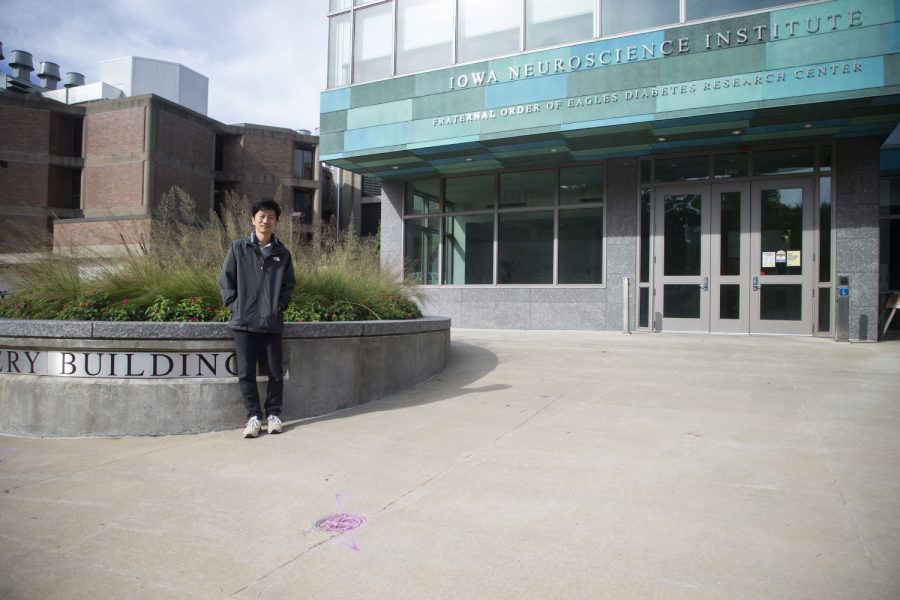UI assistant professor of biomedical engineering receives grant to combat lung disease
Yuliang Xie, UI assistant professor of biomedical engineering, was awarded a grant to create a trachea-on-a-chip tool to further research into treating lung diseases.
University of Iowa Assistant Professor of Biomedical Engineering Yuliang Xie poses for a portrait in front of Pappajohn Biomedical Discovery Building on Sept. 22, 2022.
September 22, 2022
University of Iowa Assistant Professor Yuliang Xie received a grant from the National Institute of Health to develop a lab-on-a-chip invention and help further advancements in fighting and understanding pulmonary and lung diseases.
The National Heart, Lung, and Blood Institute awarded the $214, 583 grant.
Xie is an assistant professor of the Roy J. Carver Department of Biomedical Engineering. He currently heads the Pulmonary Microfluidic Laboratory, where he and his team develop micro-engineering tools to further studies of pulmonary physiology and diseases.
RELATED: UI College of Dentistry faculty member Akimasa Tsujimoto awarded Nakao Foundation Research Grant
“Basically, we develop some models to help scientists to study how our airways can clear the bacteria out, the pathogens [out of lungs], and [understand] the mechanisms behind them,” Xie said.
Referred to by Xie as the trachea-on-a-chip, the tool is the first of its kind at the UI to be integrated into a fully functional device. The tool will replicate human airways and allow scientists to better study the airways in a more intact way without using experimental subjects.
Previously, clinical patients or animals were used in trachea research studies, but they limited the physiology of the airways, according to Xie.
“However, using animals or patients, the resolution to study the pathogen clearance is very much limited,” he said. “There is only a limited way that you can intervene airway physiology with whole animals and whole patients.”
During his time as a postdoctoral fellow, Xie began the research for this project according to Joseph Reinhardt, professor and Roy J. Carver chair of biomedical engineering at the UI.
“When we hired him, the idea would be that he would bring some of that technology and ideas and expand them further as a new faculty member,” Reinhardt said.
At that time, Xie was the first person hired under a new initiative by the department, which Reinhardt said was possible because of $12 million from Roy J. Carver Charitable Trust. This sum was donated to develop and expand research and teaching in the area of pulmonary diseases.
“As part of that, we received funds to hire some new faculty and funds to support pilot projects, to stimulate research in the area of lung disease,” Reinhardt said.
Pilot projects, according to Reinhardt, are a series of experiments intended to convince a donor that a project should be funded.
The sums from the trust were also used to help fund Xie’s startup for his invention and buy equipment. From this original fund, Xie was able to apply and receive his current grant.
Xie plans to use the funds to support future development of technologies over the next two years. This includes developing tools to combat cystic fibrosis and other diseases and developing the trachea-on-a-chip to mimic chemical and biophysical foundations in human airways.
“That money we get, we are using it to support both our people in the projects, our daily routine of experiment running, and recruiting some students to be involved in this project,” Xie said.
Jason Kosovski, director of marketing and communications for the UI College of Engineering, said many faculty members receive grants for their research and these grants are the force behind the research advancement.
“These grants are how faculty members fund their research, so it allows them to buy equipment, to hire graduate students, and to actually conduct the research, so it’s an important part of being a faculty member,” he said.
Reinhardt said it is important to fund this type of research because of the prevalence of lung disease and respiratory issues, especially with issues like COVID-19.
“Paying attention to lung disease and lung disorders I think is really important, and Doctor Xie’s technology allows us to create a model of an airway on a chip, or what he calls trachea-on-a-chip, so that we can study the behavior of the trachea in a controlled laboratory setting,” Reinhardt said.
He reiterated how the invention did not require the use of animals or human volunteers in the experiment, which let the department study lung diseases in a more cost-effective way.
“This is definitely a new area of research, and a new capability at the University of Iowa, for sure,” he said.



